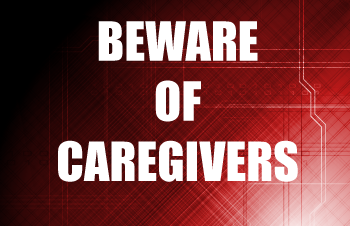 A study published in Public Policy & Aging Report (1) finds, “financial exploitation of older adults and diminished financial capacity results from age-related cognitive impairments—both pose major economic threats. “ The author continues, “The problem is complex, but it is also a problem that unquestionably exists and is assuming remarkably large personal, monetary, and social dimensions. Elder financial abuse involves millions of individuals and billions of dollars. It damages health, harms wellbeing, and arguably costs lives.”
A study published in Public Policy & Aging Report (1) finds, “financial exploitation of older adults and diminished financial capacity results from age-related cognitive impairments—both pose major economic threats. “ The author continues, “The problem is complex, but it is also a problem that unquestionably exists and is assuming remarkably large personal, monetary, and social dimensions. Elder financial abuse involves millions of individuals and billions of dollars. It damages health, harms wellbeing, and arguably costs lives.”
In 2009, U.S. household wealth was estimated to be $53.1 trillion. Older adults held approximately $18.1 trillion of it. The MetLife Study of Elder Financial Abuse estimates elder abuse cost older Americans at least $2.9 billion in 2010.
Financial abuse of the elderly in the Enhancing Workforce Capacity in the Detection and Prevention of Elderly Financial Abuse (2) states “It can take a wide range of forms including scams, overcharging, and theft;” older adults are the most vulnerable age group to this type of abuse, particularly if they are lonely, isolated, or have health issues that cause them to be dependent on others (National Committee for the Prevention of Elder Abuse, 2015) (3). The detrimental effects of financial abuse can include loss of financial security and deterioration in mental and physical health (Social Care Institute for Excellence, 2011) (4).
Daily, elderly individuals are taken advantage of by Caregivers who provide in home or institutional health assistance. Caregivers befriend the individual and convince them that their grown children—generally living at a distance—do not care about them and they, the Caregivers, are the only ones who care. With that seed planted, the Care giver to the elderly individual suffering from a physical ailment or diminished mental capacity supplants the family member. One of the Caregivers then takes the person to have a Power of Attorney drafted that places the Caregiver in charge of the affairs of the person—generally the family member with an existing Power of Attorney does not know that their Power of Attorney has been superseded.
It is widely known that today the wealth of the country is in the hands of those over 65 years of age, a number of which have physical ailments and mental deficiencies such as, dementia and Alzheimer’s. Individuals with criminal minds are aware of their vulnerability, and frequently check the obituaries to see who has died and if there is a surviving spouse. They then solicit the person by personal contact or by mail. Family members need to be aware of these schemes.
It is not easy to do, but upon death of a loved one an inventory of valuables needs to be taken before hiring a Caregiver and the inventory should be kept outside of the elderly person’s residence. With the Inventory, also take pictures of valuables (anything over $1,000) including: jewelry, paintings, antiques, life insurance and annuities, cars, boats, motorcycles, stocks and bonds, bank accounts, savings bonds, and the contents of safe deposit boxes. A trusted family member should also know about the elderly person’s cash in the safe deposit box, under a mattress, bank, and brokerage accounts and have access online to periodically review the transactions that are taking place.
Generally, the elderly will not reconcile their bank accounts. They know that they have money in their account and that they receive income from Social Security and a pension plan or IRA on a monthly basis. They generally live very frugally and suspicious transactions such as large checks to cash should be reviewed and discussed. Infrequently worn jewelry and other easily stolen items should be stored in the safe deposit box or in the possession of a trusted family member and available as needed. A family member should pay the Caregivers and maintain a relationship with the company and individuals.
Do not be a stranger to the elderly person—stay in touch, visit, send cards, email, and text to let them know you care. Get them away from the Caregiver and talk to them about general things but listen closely to what is said and the tone of the conversation. Ask objective questions such as who, what, when, why, where, and how much—actively listening to the answers. Be aware of the Power of Attorney scheme and if necessary intervene with other family members present. Also beware of gifts made to the Caregiver.
Unscrupulous Caregivers know how far they can go with the elderly because they have done it all before and will take advantage if there is an opportunity. It is becoming more prevalent, yet Caregivers are not often prosecuted for taking over and financially abusing the elderly. It starts with the Power of Attorney and next the assets of the elderly person start to disappear including jewelry and cash in a safe deposit box or in some instances the money in their bank accounts. When the elderly person passing on the remaining estate will be looted by the person with the Power of Attorney or in some cases the executor of the estate.
Your clients should know that federal and state governments have passed laws that enhance penalties such as, larceny, misapplication, and violating fiduciary responsibilities in an attempt to protect the elderly from abuse both physical, mental, and financial abuse.
If you or your clients are experiencing anything similar to what has been described above, call Sage Investigations, LLC at 512-659-3179 for a free 20 minute consultation. Let Sage shed light on the truth for you or your clients.
References:
- Public Policy Aging Report (2016)26 (1): 2-4.doi: 10.1093/ppar/prv036 Elder Wealth, Cognition, and Abuse http://ppar.oxfordjournals.org/content/26/1/2.full#ref-3
- (2016).Enhancing Workforce Capacity in the Detection and Prevention of Elder Financial Abuse. Public Policy & Aging Report, 26(1),30–33
- National Committee for the Prevention of Elder Abuse. (2015). Financial Abuse.
- Social Care Institute for Excellence. (2011). Assessment: Financial crime against vulnerable adults (Great Britain: Social Care Institute for Excellence, Adults’ Services SCIE Report No. 49).


 Call
Call